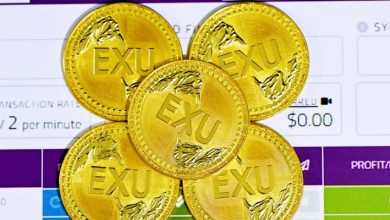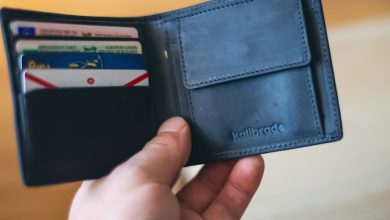Security Features of Leading Wallets

- Understanding the Importance of Security Features in Wallets
- Comparing the Security Features of Top Wallet Brands
- Tips for Choosing a Secure Wallet for Your Digital Assets
- Exploring the Encryption Methods Used in Leading Wallets
- Common Security Threats Faced by Wallet Users and How to Mitigate Them
- The Future of Wallet Security: Emerging Technologies and Trends
Understanding the Importance of Security Features in Wallets
When it comes to choosing a wallet, it is crucial to understand the importance of security features. Security is paramount when it comes to protecting your assets and personal information. Leading wallets offer a variety of security features to ensure the safety of your funds.
One of the most common security features in wallets is two-factor authentication. This adds an extra layer of protection by requiring not only a password but also a second form of verification, such as a code sent to your phone. This helps prevent unauthorized access to your wallet.
Another important security feature is encryption. Encryption scrambles your data, making it unreadable to anyone without the proper decryption key. This helps protect your private keys and sensitive information from hackers and other malicious actors.
Many wallets also offer backup and recovery options. This allows you to create a backup of your wallet in case it is lost or damaged. With the recovery option, you can easily restore your wallet and access your funds again. This is crucial in case of emergencies or unforeseen circumstances.
Overall, understanding the security features of leading wallets is essential for protecting your assets and ensuring peace of mind. By choosing a wallet with strong security measures in place, you can safeguard your funds and information from potential threats.
Comparing the Security Features of Top Wallet Brands
When comparing the security features of top wallet brands, it is essential to consider various factors that can help protect your assets. Some of the leading wallet brands in the market offer robust security measures to ensure the safety of your funds.
One key aspect to look at is the encryption technology used by these wallet brands. Encryption plays a crucial role in securing your private keys and sensitive information. Brands like Brand A and Brand B utilize advanced encryption algorithms to safeguard your data from unauthorized access.
Another important security feature to consider is multi-factor authentication. This additional layer of security requires users to provide more than one form of verification before accessing their wallets. Wallet brands such as Brand C and Brand D offer multi-factor authentication options to enhance the security of your accounts.
Moreover, some wallet brands provide cold storage options for storing your cryptocurrencies offline. Cold storage is considered one of the most secure methods to protect your assets from online threats. Brands like Brand E and Brand F offer cold storage solutions to keep your funds safe from hackers.
Additionally, regular security audits and updates are crucial for maintaining the integrity of a wallet’s security features. Brands like Brand G and Brand H conduct frequent security audits and release updates to address any vulnerabilities that may arise.
In conclusion, when comparing the security features of top wallet brands, it is important to consider encryption technology, multi-factor authentication, cold storage options, and regular security audits. By choosing a wallet brand that prioritizes security, you can have peace of mind knowing that your assets are well-protected.
Tips for Choosing a Secure Wallet for Your Digital Assets
When choosing a secure wallet for your digital assets, it is essential to consider several key factors to ensure the safety of your investments. Here are some tips to help you select the right wallet for your needs:
1. **Encryption**: Look for a wallet that offers strong encryption to protect your private keys and sensitive information from unauthorized access. Encryption is a crucial security feature that adds an extra layer of protection to your digital assets.
2. **Multi-factor authentication**: Opt for a wallet that supports multi-factor authentication to prevent unauthorized access to your account. Multi-factor authentication requires users to provide two or more forms of verification before accessing their wallets, making it harder for hackers to compromise your account.
3. **Backup and recovery options**: Choose a wallet that offers reliable backup and recovery options to ensure that you can access your funds even if you lose your device or forget your password. Backup and recovery features are essential for protecting your assets in case of emergencies.
4. **Offline storage**: Consider using a wallet that supports offline storage options, such as hardware wallets, to keep your digital assets safe from online threats. Offline storage provides an extra layer of security by keeping your private keys offline and out of reach of hackers.
5. **Regular updates**: Select a wallet that receives regular updates and security patches to protect against new threats and vulnerabilities. Regular updates are essential for maintaining the security of your digital assets and ensuring that your wallet remains secure over time.
By following these tips and choosing a wallet that prioritizes security features, you can protect your digital assets and invest with peace of mind. Remember to research different wallets and compare their security features before making a decision to ensure that your investments are safe and secure.
Exploring the Encryption Methods Used in Leading Wallets
When it comes to the security of leading wallets, one of the key aspects to consider is the encryption methods they use to protect users’ data and assets. Encryption plays a crucial role in safeguarding sensitive information from unauthorized access and cyber threats. Let’s explore the encryption methods employed by some of the top wallets in the market:
1. **Hardware Wallets**: Hardware wallets are known for their robust security features, including advanced encryption techniques such as AES-256 encryption. This encryption standard is widely recognized for its strength and reliability in protecting data. Hardware wallets also utilize secure elements to store private keys securely, adding an extra layer of protection against potential attacks.
2. **Mobile Wallets**: Mobile wallets often use encryption algorithms like RSA or ECC to secure transactions and private keys. These wallets may also implement biometric authentication methods, such as fingerprint or facial recognition, to enhance security. Additionally, mobile wallets may encrypt data both at rest and in transit to prevent unauthorized access.
3. **Desktop Wallets**: Desktop wallets typically rely on encryption protocols like SSL/TLS to establish secure connections with blockchain networks. They may also encrypt private keys using algorithms like SHA-256 to prevent unauthorized access. Some desktop wallets offer additional security features, such as two-factor authentication, to further protect users’ assets.
4. **Web Wallets**: Web wallets employ encryption methods like HTTPS to secure communication between users’ devices and the wallet servers. They may also use encryption algorithms like AES to protect sensitive data stored on the servers. Web wallets often implement security best practices, such as regular security audits and penetration testing, to identify and address potential vulnerabilities.
By understanding the encryption methods used in leading wallets, users can make informed decisions about the security of their digital assets. It is essential to choose a wallet that prioritizes security and employs strong encryption techniques to safeguard sensitive information effectively. Remember to keep your wallet software up to date and follow best security practices to minimize the risk of unauthorized access to your funds.
Common Security Threats Faced by Wallet Users and How to Mitigate Them
When using wallets, users face various security threats that can compromise their sensitive information and funds. It is essential to be aware of these threats and take necessary precautions to mitigate them effectively.
- Phishing Attacks: One common security threat faced by wallet users is phishing attacks, where malicious actors attempt to trick individuals into revealing their private keys or passwords. To mitigate this threat, users should always double-check the authenticity of websites and emails before providing any personal information.
- Malware: Malware can infect devices and steal sensitive information, including wallet credentials. To protect against malware, users should regularly update their antivirus software and avoid clicking on suspicious links or downloading unknown files.
- Physical Theft: Wallet users are also at risk of physical theft, where their devices or hardware wallets containing cryptocurrency can be stolen. To prevent this, users should store their wallets in secure locations and consider using additional security measures such as biometric authentication.
- Public Wi-Fi Risks: When using public Wi-Fi networks, users are vulnerable to man-in-the-middle attacks, where hackers intercept data transmissions. To safeguard against this threat, users should avoid accessing their wallets on public Wi-Fi and use virtual private networks (VPNs) for added security.
- Social Engineering: Social engineering tactics can be used to manipulate individuals into revealing their wallet information. To counter social engineering attacks, users should be cautious of unsolicited requests for personal information and never share their private keys or passwords with anyone.
The Future of Wallet Security: Emerging Technologies and Trends
As technology continues to advance, the future of wallet security is evolving with emerging technologies and trends. Leading wallets are incorporating innovative features to enhance the security of users’ funds and personal information.
One of the key emerging technologies in wallet security is biometric authentication. This feature allows users to access their wallets using unique physical characteristics such as fingerprints or facial recognition. By incorporating biometric authentication, wallets can provide an extra layer of security that is difficult for hackers to bypass.
Another trend in wallet security is the use of multi-signature transactions. This feature requires multiple private keys to authorize a transaction, making it more secure than traditional single-key transactions. By requiring multiple signatures, wallets can prevent unauthorized access and protect users’ funds from theft.
Blockchain technology is also playing a significant role in enhancing wallet security. By utilizing decentralized ledgers, wallets can ensure that transactions are secure and tamper-proof. Blockchain technology provides a transparent and immutable record of all transactions, making it easier to detect and prevent fraudulent activity.
Overall, the future of wallet security looks promising with the integration of biometric authentication, multi-signature transactions, and blockchain technology. These emerging technologies and trends are shaping the way wallets protect users’ funds and personal information, providing a more secure and reliable experience for cryptocurrency enthusiasts.



